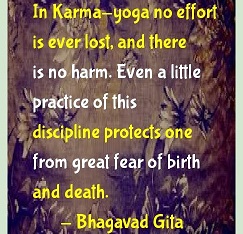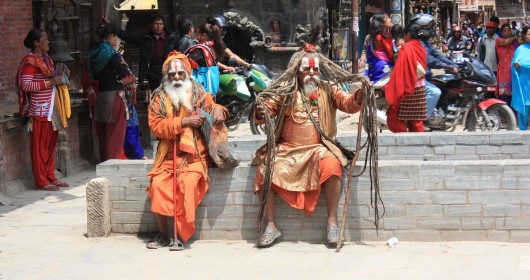How does one become a Karma Yogi? Find out here

My friends are karma yogis. This past weekend, they helped me to move from one home into another, knowing that I felt that I was in a state of disarray and chaos, understanding that my heart was experiencing much sadness and grief, confident that their support would help light a spark and uplift me. My friends knew all of this without me even having to articulate it to them. I call my friends karma yogis because they faithfully practice the art of selfless service for others, including for me. They give support, love, encouragement, and faith without expectations that they will receive the same in return. Ultimately, they act with true love and kindness in their hearts.
Most North Americans now know the word karma, since it has been printed on enough silly t-shirts and marketed by capitalists to the moon and back. Hinduism has become sexy and interesting and so its principles and vocabulary has made its way into our lingo and our lives. Plenty of self-help books have been written about karma, and authoritative direction has been given by those who do not even have any roots in the Indian culture or its practices. But, this is a critique for another time!
The ordinary every day use of the ancient Sanskrit word karma has come to centre on “the law of cause and effect”, the idea that what goes around comes around. The word karma often inspires both fear and faith in people, and some take it very seriously. Many try to live their lives in a way that they do not create “bad karma” for themselves, and/or they make conscious efforts to create “good karma” through their actions. This narrow idea of karma revolves around the individual self in that it is focused on what I, myself, am getting out of my own actions, and not necessary how my actions are impacting others or making the world a kinder, more loving place.
In the ancient Indian scripture, the Bhagavad Gita (the “Gita”), karma yoga is defined as the yoga of action, or the yoga of service. According to the Gita, there are many ways to attain spiritual enlightenment through yoga (which in this context is not the physical practice of hatha yoga or asana, but is a more holistic spiritual practice). There is bhakti yoga (the yoga of devotion), jnana yoga (the yoga of knowledge), raja yoga (the yoga of mind control, i.e. meditation), and karma yoga (the yoga of action). The Gita describes each of these types of yoga, or spiritual practices, in some detail, and highlights the benefits of each, and the fact that they are all relatively equal when it comes to their power and effect in helping a person attain spiritual enlightenment.
Karma yoga involves selfless service. This means, one must serve others with love, without being concerned about the outcome of one’s actions. There must be no expectations for reward, or praise, or self-satisfaction, or an ego boost. There must be no expectation that another will do the same action in turn. This type of selfless action can come from nowhere but from love. It is a way of unconditionally loving the divine essence in everything and everyone by seeing others as we see ourselves. In serving others we then lose our sense of “I”, and everyone becomes connected to us. We see the greater whole, the bigger picture, and realize that we are not alone. We realize that no matter what we experience in our lives, it is simply part of a grand plan that we are ultimately unable to control.
My friends are karma yogis for many reasons, but this weekend it was because they came all the way from far corners of the Greater Toronto Area to help me move despite their busy lives and the challenges they were going through themselves. They put aside enjoying quality time during the greater part of a beautiful sunny day in order to be with me to help me carry my pain. They showed up on time, smiling, joking, ready to lift boxes and move furniture. They didn’t ask for anything from me except for a sip of water to quench their thirst. They sacrificed quality time with their family members and other loved ones so they could be with me during a difficult transition. A couple of my friends showed up even though they weren’t feeling well. They brought with them not only their physical strength and endurance, but their positive energy and loving kindness.
My karma yogis hugged me, they gazed into my heart, and they became fully present with me for the 5 hours they were with me, guiding me through. If their actions were not karma yoga, then I do not know what is.
Other friends of mine were karma yogis in the way they took care of me during the stages leading up to moving day. My friends opened up their homes to me, cooked nourishing meals, shared music, poetry and art, sent me inspirational messages, prayed for me, and sent all the love and positive vibrations they could to help me heal through a difficult time.
With so much gratitude I thank my friends, my karma yogis.
The wonderful thing about karma yoga is that it inspires others to do the same. The idea that we should “pay it forward” when it comes to kindness, is a time honoured practice. When we are kind to others, either to those we love or to those who are complete strangers in our lives, we are creating a magic of sorts. Hearts open up and we communicate with others in a more meaningful, soul-directed way. The time it takes to be kind and giving in our actions is time well spent. It is good karma!
Will you take the time to thank the karma yogis in your own lives?
Will you take the time to be a karma yogi today?





